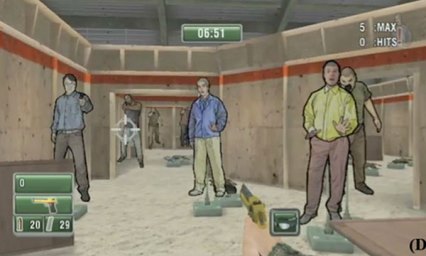Posts Tagged ‘Cognitive-tests’
Study: Training law-enforcement “itchy brains” can reduce shooting-related civilian casualties
. Brain Training May Help Avoid Civilian Casualties (Duke Today): “Although firing a gun seems like one action, it is made up of many smaller decisions and movements that require coordination between multiple brain areas. The sudden decision to not shoot, called ‘response inhibition,’ is critical when someone innocent comes into the line of fire.
Read MoreHarnessing brain training games to better research, prevent and treat Alzheimer’s Disease
— Brain Training Database: Treasure Trove for Preclinical Alzheimer’s Research? (Alzforum): “Some researchers think brain games in general—which adapt to each user’s cognitive ability—may one day serve as cognitive diagnostics to
Read MoreShould Hospitals Monitor, and Work to Maintain, Patients’ Cognitive Function?
Hospitalization Linked to More Cognitive Decline in Elderly (Medscape): — “Older adults have a 2.4‑fold increase in the rate of cognitive decline after hospitalization, an increased risk that persisted after adjustment for severity of illness and length of hospital stay, according to a new study.”
Read MoreStudy: Cognitive Markers or Biomarkers to manage Cognitive Health across the Lifespan?
Predicting Alzheimer’s Disease More Accurate Through Cognitive Changes Than Biomarkers (Medical News): “Measuring people’s changes in cognitive abilities is a better predictor of Alzheimer’s disease than changes in biomarkers, researchers from the Benito Menni Complex Assistencial en Salut Mental, Barcelona, Spain, reported in Archives of General Psychiatry, a JAMA journal.” “The investigators used a range of…
Read More10% Students may have working memory problems: Why does it matter?
Working memory is our ability to store and manipulate information for a brief time. Read this blog post on how 10% students may have working problems.
Read MoreEducation builds Cognitive Reserve for Alzheimers Disease Protection
Given the growing media coverage mentioning the terms Cognitive Reserve and Brain Reserve, you may be asking yourself, “What exactly is my Cognitive (or Brain) Reserve?” The cognitive reserve hypothesis, tested in multiple studies, states that individuals with more cognitive reserve can experience more Alzheimer’s disease pathology in the brain (more plaques and tangles) without…
Read More



